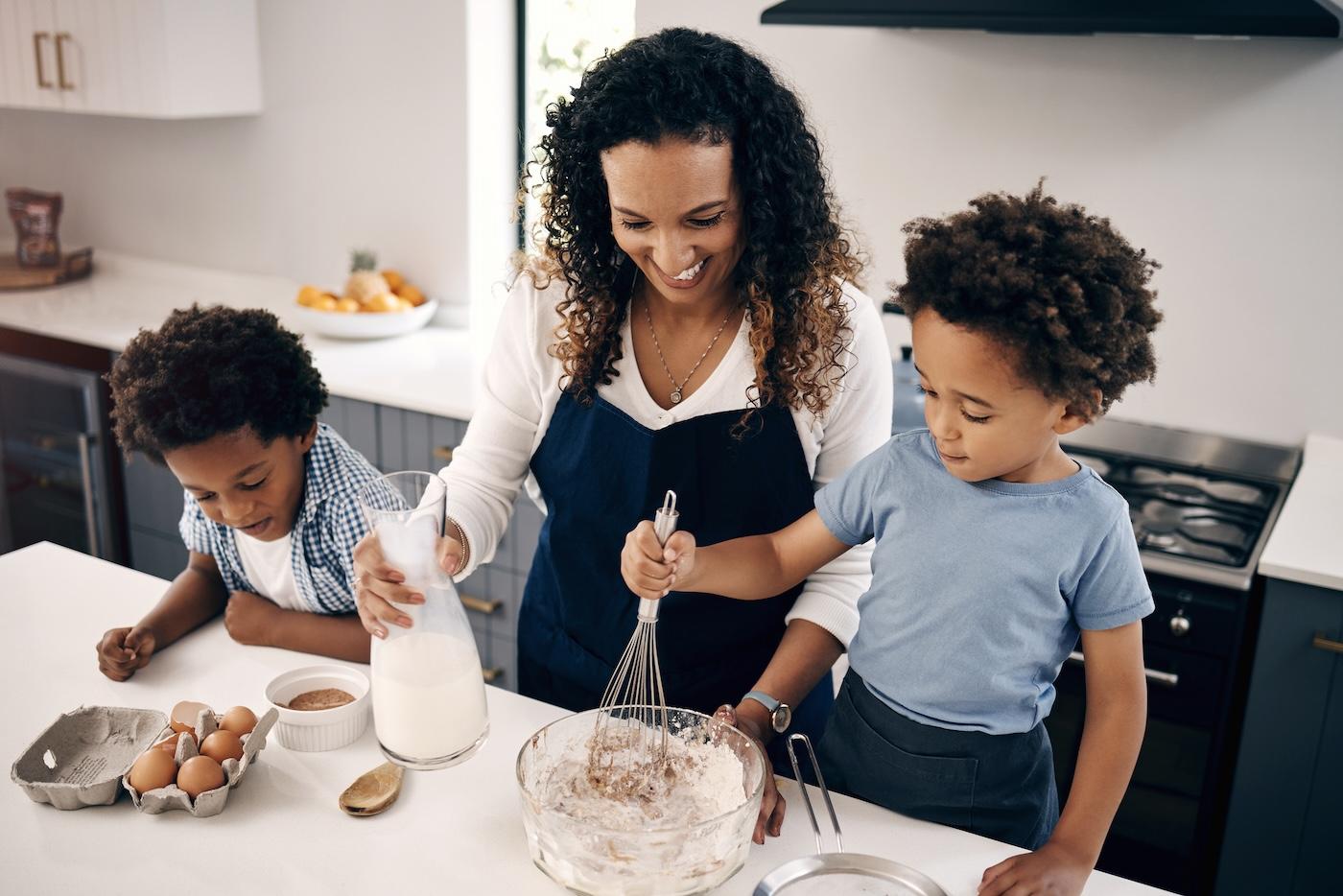TODDLER
How Bad Is Screen Time for Babies and Toddlers, Really?
Learn what science says about little ones’ exposure to screens.

Written by
Happiest Baby Staff

These days, just about no one is fazed by a baby or toddler watching a loop of Ms. Rachel or Bluey videos while getting pushed in a shopping trolley or strolled in a pushchair, waiting for lunch to be served, or sitting in the doctor’s waiting room. In fact, if you dare go out and about with a restless or fussy little one, folks may straight up judge you for not handing over a pacifying electronic device! So, it is not totally surprising that recent research shows 12-month-olds spend nearly 60 minutes a day on screens—and by the time they are 3, that number balloons to over two hours a day.
This, of course, butts right against the World Health Organization’s recommendation of no screen time for babies under 2 years old and the American Academy of Pediatrics’ (AAP) recommendation of zero digital media exposure before 18 months—and maxing out screen time at one hour a day at age of 2.
Naturally, this leaves many parents feeling frustrated and guilty. In a recent report, 67% of parents said “too much screen time” was their top children’s health concern, outranking big-hitters like depression, bullying, anxiety, and school violence. But how worried do parents need to be over babies’ and toddlers’ screen time? Here, we break down what the science says—and offer tips on how to do screen time “right.”
How Screen Time Affects Infants and Toddlers
Right now, not even the scientists who study the impact of screens on children have all the answers. They cannot for-sure tell you that your toddler playing Peekaboo Barn or watching Blippi will snowball into less-than-ideal behaviours down the road. But they do know that most of a baby’s brain development happens in their first 2 years. Here is a taste of how screen time may affect infants and toddlers…
Executive Functioning
Two hours of screen time a day at 12 months old literally changes a child’s brain activity, creating stronger theta waves than beta waves. Theta waves are associated with inattention, which may be why Boston Children’s Hospital researchers then saw diminished executive functioning skills in these children by primary school. (Executive functions are a collection of cognitive skills needed for planning ahead, organising, impulse-control, decision-making, and learning.)
Vocabulary
While parents may lean on screen time for a little bit of quiet, the silencing impact goes well beyond the length of a Cocomelon video. A 2024 report in JAMA Pediatrics found that, on average, the 3-year-olds studied were exposed to roughly 2 hours 52 minutes of screens daily. Just one additional minute of screen time was associated with children hearing 6.6 fewer adult words, saying 4.9 fewer words, and engaging in 1.1 fewer conversational exchanges with their grownups. Other research shows that children’s vocab takes a hit even when screens are simply on in the background. That is because parents speak less when the TV is on—and their talking is inherently linked with child language development.
Sleep
Toddlers lose a minute of sleep each night for every minute of touch-screen time they have during the day, according to a 2021 report in the journal Sleep. Researchers note that handheld devices that are usually positioned close to a child’s face are especially harmful due to the intensity and proximity of sleep-disrupting blue light. And for every additional hour of TV viewing beyond the initial hour, the risk of developing a sleep disorder increased by more than 12%, according to another report. (Learn the signs your toddler is not getting enough sleep.)
Developmental Delays
When compared to 1-year-olds who were exposed to less than 60 minutes of screens a day, those who watched up to two hours daily were 61% more likely to experience communication delays by 2, according to a study in JAMA Pediatrics. That risk bumped to nearly five times greater for those with four or more hours a day of screen time—and extended to problem-solving, fine motor, and social skills delays, as well.
Empathy
Experts note that exposure to screens in infancy reduces a baby’s ability to read human emotion. After all, until they develop language, all their communication is nonverbal, which means looking at faces is key to building empathy. A 2019 report in the British Journal of Developmental Psychology shows that too-much screen time into the toddler and preschool years continues to chip away at this skill. Researchers found that the more TV children watched at 4 years old, the lower their emotional understanding was at 6.
How Screen Handle Screen Time With Infants and Toddlers
“We know the AAP recommends skipping screens for kids under 18 months and that, over that age, under one hour a day of high-value shows is best,” says paediatrician Dr. Harvey Karp, bestselling author of The Happiest Toddler on The Block. “But like all general guidelines, these are meant to be broken from time to time. An even better parenting rule is that it is good to have flexible plans and not be overly committed to rigid rules.”
That said, we know how addictive screens can be to adult brains, so it is always a good idea to assume the “less is more” mentality with children of all ages. “I like to think of screen time like candy: a little is okay every so often, but not a steady diet of it,” says Dr. Karp.
Here are some doable and realistic advice for managing your toddler’s screen time:
Actively watch with your child.
Think of screen time as an opportunity to connect with your child. Researchers call this “interactive co-viewing,” and it simply means asking questions, pointing out objects or characters, and offering your tot explanations or commentary on what you are watching. This fosters communication and bonding—and research shows that doing this with high-quality programing can even improve a child’s language skills. (Learn more ways to improve your child’s language development.)
Scaffold screen time.
While co-viewing is ideal, it is not exactly feasible if you are using screens to temporarily occupy your child while you make dinner. Experts note that you should aim to watch a few episodes of a specific program with your child and then talk about the content. Then once your child becomes more familiar with how media works, step back, take care of what you need to do, but continue to check in.
End your day with books and cuddles, not screens.
Cap your child’s day with warm feelings, not a glowing screen. Turn off screens about 60 minutes before bedtime. “The blue light from TVs, phones, and tablets can overstimulate tired children and postpone the release of melatonin, which makes the kids feel more awake,” says Dr. Karp.
Set clear screen-time limits.
Make sure your kiddo knows how much time they can spend on screens. While your 2-year-old cannot tell time yet, you can say things like, “When the timer goes “ding”, it is time for the iPad to go night-night.” Or set up routines such as, screen time is always limited to between dinnertime and bathtime.
Be a screen-time role model.
Do not be fooled: Even babies and toddlers can spot a double standard! It is up to the adults in the household to set the screen-time tone, which means always turning off the TV and putting away your smartphone during media-free times with your family. Do not leave screens on in the background. And try your hardest to turn off your phone when you are with your child.
Do your research!
Not all children’s programming, apps, and games are created equal! Use sites like Common Sense Media to help cut through the clutter and ensure your child is exposed to age-appropriate, high-quality content. It is also a good idea to preview content before your child engages with it.
Lean on parental controls.
Kids are both tech-savvy and tech-curious. It is up to you to set parental and privacy controls on all your devices and services. Through parental controls, you will be able to block specific websites and apps, filter content, and set time limits. (For more on what is right for you, check out the AAP’s guide.)
Create a media plan.
Establish clear screen time boundaries like, which rooms are screen-free zones, what time should devices be silenced, and which family activities can we engage in lieu of being on screens. (Use this as a starting point.)
Bottom Line on Babies, Toddlers, and Screens
Not all screentime is harmful, and in truth, screens can allow stretched-thin parents a bit of much-needed breathing room.
“So many parents deserve a huge round of applause for doing this demanding, yet delightful, job of parenting without the help of a huge extended family, as was the norm throughout the entire history of humanity,” says Dr. Karp. “Please do not judge yourself too harshly for a little bit of digital babysitting.”
Like with most things in life, screen time is all about balance. Watching some kids play with toy trains on YouTube or singing along to the Baby Shark video for the millionth is not the end of the world, especially when you are also spending lots of quality time off-screen with your little one.
Disclaimer: The information on our site is NOT medical advice for any specific person or condition. It is only meant as general information. If you have any medical questions and concerns about your child or yourself, please contact your health provider. Breastmilk is the best source of nutrition for babies. It is important that, in preparation for and during breastfeeding, mothers eat a healthy, balanced diet. Combined breast- and bottle-feeding in the first weeks of life may reduce the supply of a mother's breastmilk and reversing the decision not to breastfeed is difficult. If you do decide to use infant formula, you should follow instructions carefully.
SHARE THIS ARTICLE
PARENT PICKS
Bestsellers



















